
Women at work

Indian Women, Inordinately Burdened By HouseWork, Pay The Motherhood Penalty
Aug 4, 2018, By Namita
Delhi/Gurgaon: Underneath two gigantic chandeliers in the conference room of a posh Gurgaon hotel, 250 elegantly dressed women are ferociously beating drums. Faster, slower, louder, stop. It’s easier than it looks. The women break out into a sweat as they whistle and shout hoi in unison, on cue.

As Indian Women Leave Jobs, Single Women Keep Working. Here’s Why
June 4, 2018, By Namita
New Delhi:: For as long as she can remember, Kolkata-based Ruchhita Kazaria, 36 and never married, has known she would have to get a job. Two of her elder sisters started working right after school: “My father was clear that if we wanted to study beyond school, we would have to pay for it,” said Kazaria. “It’s not that he couldn’t afford it, but he said that as girls we had to learn to be financially independent.”
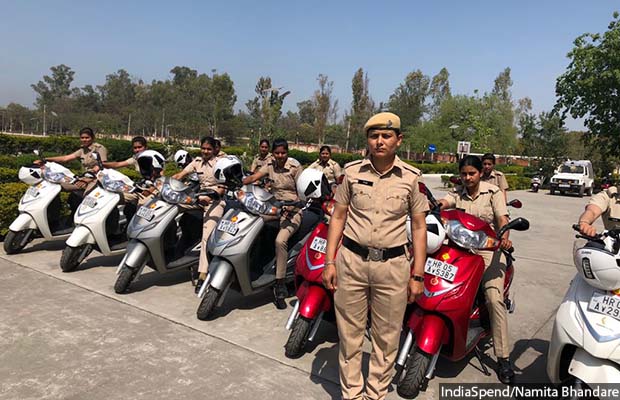
How Scooters Are Helping Haryana’s Women Get To Work
May 19, 2018, By Namita
Madhuban and Sonepat (Haryana): It’s training day at the Haryana Police Academy in Madhuban, where 14 women constables stand to attention alongside their shiny Honda Duets, white helmets clamped to their heads.
The women, the daughters of teachers, labourers and farmers, know this: They will not be promoted to the next rank unless they learn to drive two-wheelers.
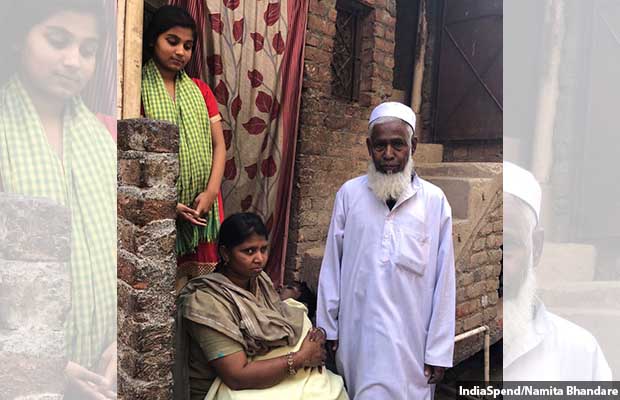
On Delhi’s Ragged Edges, Women Bear Highest Cost Of Scant Transport
April 07, 2018, By Namita
Bawana (Delhi): When Momeena got a job at a purse factory on February 25, 2018, her husband flew into a rage. Never mind that he is, she said, a drug addict who beats her regularly, works occasionally and gives her money rarely. Yet, when she announced that she would be leaving home every day to go and work, he wasn’t happy, she said.
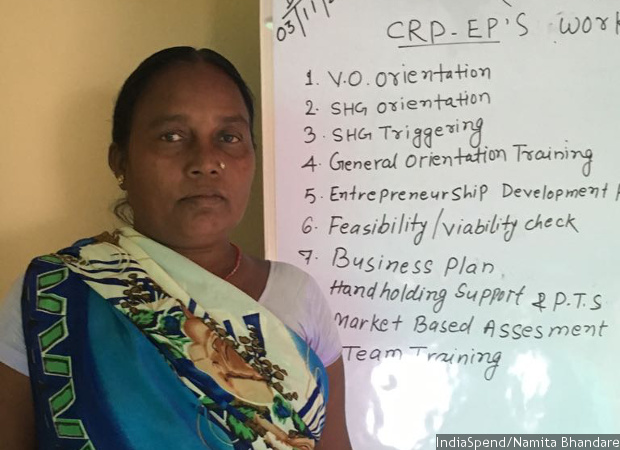
Bihar’s Poorest Women Are Changing Their Lives, With A Little Help
November 25, 2017, By Namita
Gaya (Bihar): Amola Devi had never been to school, had never seen the inside of a bank and is a musahar, or rat-catcher, a Dalit caste so low and marginalised that the Bihar government puts it in a special category known as mahadalit. Ten years ago at her home in the village of Zindapur in this southern district of Bihar, two of her eight children fell ill and died because she could not afford medical care. On a good day, her husband, a rickshaw puller, earned Rs 200, of which Rs 100 went to the rickshaw owner. She had to feed and clothe her family with the rest. None of her kids went to school. When she went to the village well to draw water, she had to wait for the others to go first, lest her bucket polluted theirs by contact.

Judge To Worker: The Spread Of Sexual Harassment In India
November 25, 2017, By Namita
It’s invariably a rough crowd at the Traffic Court–not fun to deal with for any magistrate, male or female. Lawyers cussing over minor traffic fines is all in a day’s work. Yet, when she passed an adverse order for a minor traffic offence, the young woman magistrate was unprepared for the viciousness of the verbal assault made by the male lawyer in open court against her. “Teri aukaat kya hai (who the hell are you)?” he is said to have yelled in Hindi in open court. “Teri chaddi phaad ke rakh doonga (I will rip off your panties).”
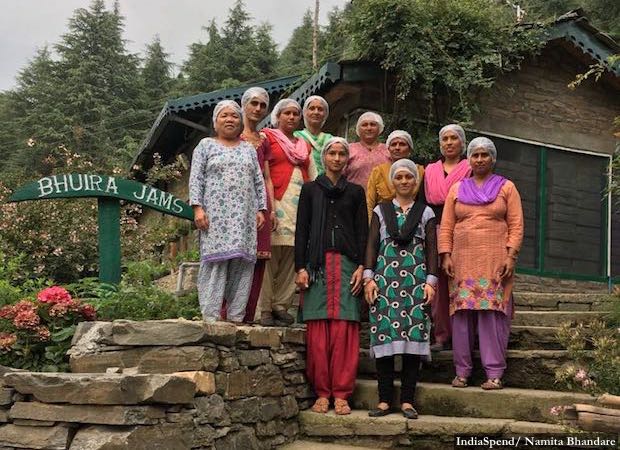
Why Himachali Women Work: A Jam Factory May Have Answers
September 18, 2017, By Namita
Bhuira, Himachal Pradesh: No jam was being made that morning at the Bhuira Jam Factory in this remote Himachal Pradesh village. There was no fruit to be weighed and sorted, cut and boiled. A basket of ripening peaches lay unattended by the weighing scale.
The all-women jam-making team at Bhuira had a new task: Emptying out the office so that it could be painted. Perhaps out of habit, the women had their caps neatly on, their hair firmly tucked in, a smidgen of sindhoor (vermilion) peeping out from beneath.
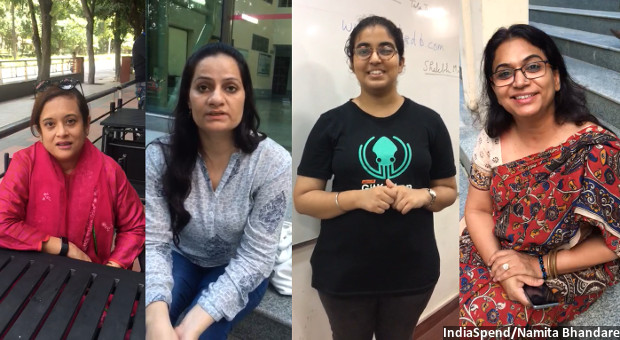
Why India’s Most Educated Women Are Leaving Jobs Faster Than Others
September 09, 2017, By Namita
New Delhi/Gurugram: It was while working for a shopping website that Parul A Mittal, 43, discovered her calling as a writer. It was 2008. She had been working for 12 years, was at middle management level at her company and no reason to quit.
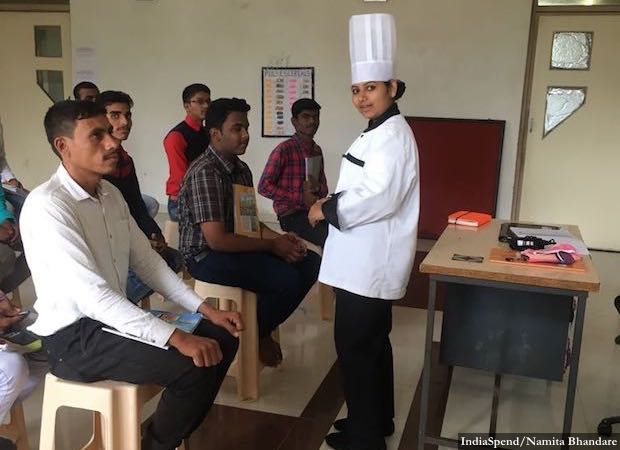
Why India’s Hospitality Sector Must Win Over Parents Of The Skilled Women It Needs
September 09, 2017, By Namita
Aurangabad (Maharashtra): Banudas Sonawane is an angry man: Angry that his eldest daughter, a 19-year-old, joined a hospitality course without his permission. Angry that the girl, Anita, didn’t call home often enough while she was at the two-month long residential course–even though he had given her a paid up SIM card. Angry that the job she was offered after the course was, in his eyes, low in status. Angry that a government job did not come her way.
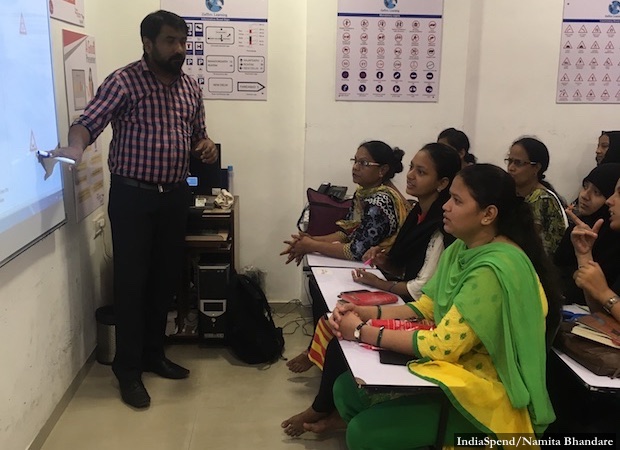
Housework Keeps India’s Women At Home. Some Women Are Changing That
August 18, 2017, By Namita
Mumbai: There’s a great deal of giggling at Nikhil Kalelkar’s class for two-wheel riders. “If you’re passing a person who is handling an animal that looks like it might get out of control, how will you respond?” asked Kalelkar. “Will you slow down or will you blow your horn?”
“Sir, I’m terrified of animals. I will simply stop,” said 20-year-old Shweta Jadhav, her hair pulled back in a neat plait.

Women@work: In A Haryana Factory, Tradition Clashes With Aspiration
August 12, 2017, By Namita
Winter brought with it shorter days and the bleak realisation that her brief career was over.
Her village was a couple of kilometres away from the bus stop at Saanpla in Haryana’s Jhajjar district. In the summer when the days were long, it seemed safe enough to walk back home from the bus stop alone. But by November it was already dark by the time she got off the bus and walking back home alone no longer seemed like such a great idea.

Why Indian Workplaces Are Losing Women: Our Nationwide Investigation Begins
August 05, 2017, By Namita
In the first four months of 2017, a nugget of information went by unnoticed: While jobs for men increased by 0.9 million, 2.4 million women fell off the employment map, according to the Centre for Monitoring Indian Economy (CMIE), a think tank.